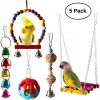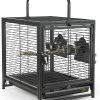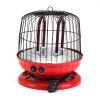Birds are naturally vocal, using a range of sounds to communicate, whether to warn their flocks of predators or attract mates. Each species has its unique repertoire of calls, chirps, and songs. However, some birds are notably quieter than others, producing soft background chatter or mild calls. This makes them more suitable to be kept as pets in households where they will not disrupt the environment by making loud noises.
Who Might Want a Quiet Bird For a Pet
- People Living in Shared Spaces — Living in shared spaces like apartments often means dealing with thin walls, so having a quiet pet bird is a big advantage. They are ideal for communal living because they take up little space, keep noise levels low, and prevent disturbances to neighbors or roommates.
- Specific Needs of Family Members — Quiet pet birds are perfect for homes with young children or elderly family members, as they are less likely to startle others with sudden screeches. Since loud noises can increase stress and worsen health conditions, these birds help maintain a healthier environment.
- People Who Need a Quiet Environment — Students, artists, or professionals working from home prefer a distraction-free environment and would most likely want a bird that doesn’t interrupt them often by making loud noises.
List of the Quietest Birds for Pets
The birds that typically produce sounds at 60-70 decibels, similar to the volume of a normal human conversation, are generally considered to have low to moderate noise levels.
Quiet Birds For Beginners
- Budgerigars
- Cockatiels
- Canaries
- Pacific Parrotlets
- Zebra Finches
- Gouldian Finches
Quiet Birds For Experienced Owners
- Senegal Parrots
- Diamond Doves
- Pionus Parrots
- Buttonquails
- Bourke’s Parakeets
- Lineolated Parakeets
It’s important to note that no matter the type of pet, they are sure to make some noise. If a bird makes no noise at all, it could be a sign of trauma or illness.
FAQs
When a bird is being loud, try providing toys to stimulate it if it is bored. Lowering background noise may also help prevent it from trying to outcompete sounds. Remember to never yell while speaking to your bird, as doing so might induce it only to mimic you.






